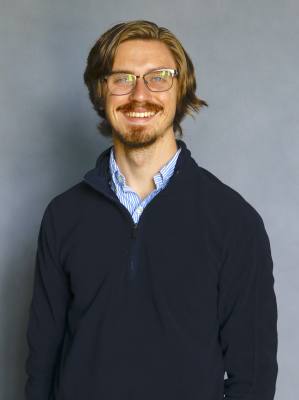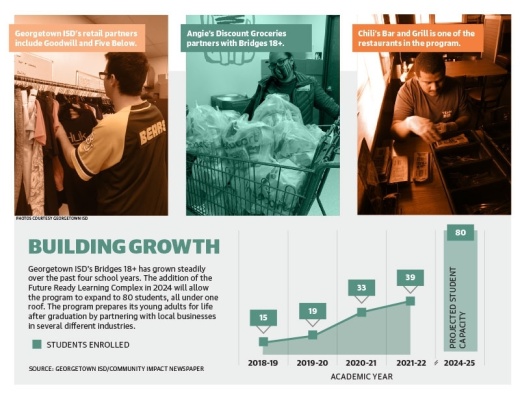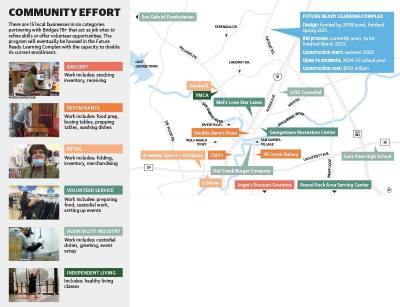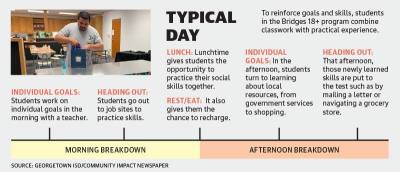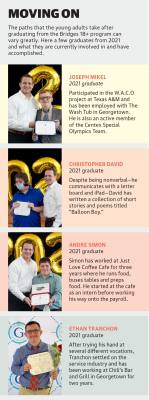In November, GISD voters passed Proposition A, which allocates $333 million for facility improvements and new developments, including the Future Ready Learning Complex. The Georgetown Planning and Zoning Commission approved Jan. 4 GISD’s request to rezone a parcel of land at 5001 Airport Road from a planned unit development to a public facility zoning so the district may use it for school purposes.
Once complete, the Future Ready Learning Complex will house the district’s advanced career and technical programs; the Bridges 18+ Transition Program for young adults; Richarte High School, the district’s alternative school of choice; and the Early Learning Center, currently known as Eagle Wings, which provides child care for the children of GISD employees and students, according to a spokesperson.
Giving those programs room to grow, in addition to freeing up space at its traditional high schools, gives the district more avenues to improve programs such as the Bridges 18+ program, Special Education Coordinator Rachael Hull said.
“Through individualized learning and setting aspirations and goals for students, we work to make that happen for them,” Hull said. “We see our students with limited skills or that need additional help to make that transition, and we help them become members of the community and teach them to serve the community.”
The added space provided at the Future Ready Learning Complex will allow Bridges to grow from its current enrollment of 39 to a capacity of 80 all under one roof for the 2024-25 school year. Design for the complex was completed in spring 2021, according to a district spokesperson, with a bid deadline set for early March 2022 to allow for construction to begin as early as May of this year.
Transitioning to adulthood
Bridges 18+ is a transition program that helps young adults with disabilities move on from high school into adult life, Hull said. The new facility will give Bridges 18+ more capacity to enroll students, make job training more accessible and give students a new environment to focus on their goals. Currently, Bridges 18+ is held at Georgetown High School, East View High School and at the district's facility at 4901 Scenic Lake Drive in the former Carver Elementary School.
James Patton, associate professor of instruction at the University of Texas at Austin, said young adults with disabilities need three things to transition into adult life well: obtaining meaningful and competitive work; learning in a college, work or home setting; and living independently within a community. Transition programs are designed to help with these factors, Patton said.
“The goal of transition is to prepare students for life after school ends,” Patton said. “They need the knowledge, skill set and support that will allow them to be successful into adulthood.”
Often young adults with disabilities need more help to transition into adult life than deciding what comes after high school, Patton said. An individual’s environment also plays a role, such as needing to live with family for an extended period of time. However, he said not all young adults with disabilities want to go to college and seek out work instead.“This transition process is more complicated than some people think,” Patton said. “To do it well requires a lot of really sound work. If I’m ever working with a kid with special needs, I think beyond what is minimally required in terms of what they need.”
How Bridges 18+ is helping adults with disabilities
GISD launched its Bridges 18+ program in 2007 to help students with physical and intellectual disabilities transition into adult life. Students typically graduate the program by the age of 22, but some complete the program before then, Bridges lead teacher Corey Graef said. The program has grown from five students in 2007 to 39 students in the 2021-22 school year, Hull said.
The program is not an extension of high school education. Instead, students visit various job sites to learn and practice certain skills, become familiar with how to use local resources and set individual goals. The program is centered around practicing basic and employable skills and getting involved in the community. In the morning, Bridges 18+ teachers and job coaches take students to visit various job sites the program partners with such as H-E-B, Just Love Coffee, Chili’s and Hat Creek Burger Co. Students complete tasks, such as cleaning tables, organizing clothes or putting together to-go orders.
“It’s based on different industries such as retail, restaurants, grocery, volunteer and vocation creation where they make resumes and job applications,” Graef said. “They are getting real-life experience that will give them more employable skills.”Once students are finished with their job sites, they learn social skills to make friends as well as learn more about Georgetown and the local resources, Graef said.
“We may be learning about the post office and how to send mail,” Graef said. “Where we are at right now is learning about groceries, how to make a shopping list and how to identify healthy eating options. Then we go out to grocery stores to gain that real-life experience.”
One student of the program, Jordyn Bell, said she loves to make coffee for others at the new Bridges Boutique, a shop where students sell candles, journals, towels and other items they create with program staff.
Jordyn Bell moved to Georgetown from San Diego in 2020 after she graduated from high school and enrolled in Bridges 18+ in 2021, her mother, Nicole Bell, said. It was hard for her to transition from having a lot of friends in high school to moving to a new place, Nicole Bell said. However, the program has helped her through that.
“Another thing Jordyn is really good at is making friends,” Hull said. “She has made a whole campus full of friends. She is really good at good mornings and her social skills”
When the family moved, the Bells wanted their daughter to have an opportunity to get involved in the community and get a job. The program is leading her in the right direction, but there is more to discuss when it comes to her future, Nicole Bell said.“We’ve talked about colleges, but she doesn’t want to go anywhere,” she said. “Bridges 18+ is a really good stepping stone for her. We’ll see where her place will be once she gets older.”
While learning how to live independently, students in the program also have to learn how to overcome the stigma of having a disability, Bridges 18+ teacher Sandra Murawski said.
“When people think about a disability, they think about someone who is not capable of achieving anything,” Murawski said. “That is the farthest thing from the truth. Some of these adults may not be able to walk or are not potty trained, but they are smarter than any of us. It is amazing what they can do and how much they have to offer, but the community does not make room for them.”
Bridges 18+ is changing how students live their lives at home as well, Murawski said. In many cases, parents do not know what their children with disabilities are capable of doing because they do not give them an opportunity to push themselves, she said.“I had one student where the parents didn’t even know their child was capable of doing laundry until she learned how to through the program,” Murawski said. “We really start to see a lot of change happening when a student learns a skill in the program and then is asked to do it at home and then parents start to ask them to do more and more.”
“Transportation is the hardest piece,” Graef said. “It’s the most important factor to be independent. For many of us we get our driver’s license at 16 and gain more independence. Driving is not an option for most of our students, which is why learning how to use public transportation is so important.”
Exploring opportunities after Bridges 18+
After Bridges 18+ students graduate from the program, Graef said they could find jobs in the area, such as at the Georgetown Transportation Department, Rivery Coffee House, Old Navy and more. One graduate of the program works two jobs at Reid’s Cleaners and Laundry and Just Love Coffee, Graef said. A student last year published a book of poetry, he said.
Other students enroll in Austin Community College or get involved with Project Search, a transition to work program helping adults with significant disabilities find work. Project Search is an organization of five other organizations, and Bridges 18+ is partnering with Ascension Seton Williamson Hospital to help graduates get connected with more opportunities, Hull said.
“Project Search trains them in internships for nine months, and once they complete the program the idea is for them to work at that business,” Hull said. “We have several students sterilizing instruments and prepping operating rooms. Others love the kitchens, so they are cleaning tables, setting trays up and going to serve patients with food.”
It is important to note the program is not just about students being employed, Graef said.
“That’s why we provide volunteer opportunities as well because we believe all of our students have a purpose and a meaning and can give back to the community in some way,” Graef said. “We have students who continue to volunteer after graduating.”
When students move from a transition program to independent living, Patton said they typically lose access to the services that once supported them. Part of transition planning is linking a student with other support services for when they leave the program, he said.
Bridges 18+ helps graduates get connected to other programs that can help them with independent living and finding work, such as Bluebonnet Trails Community Services and the Texas Workforce Commission, Graef said.
“We just have to figure out what Jordyn has a passion for and then hone in on that,” Nicole Bell said. “Right now her favorite thing to do is make coffee for people at Bridges Boutique even though she doesn’t drink coffee. She really likes the smell of it, though.”
Editor's Note: This story was updated for clarity.


